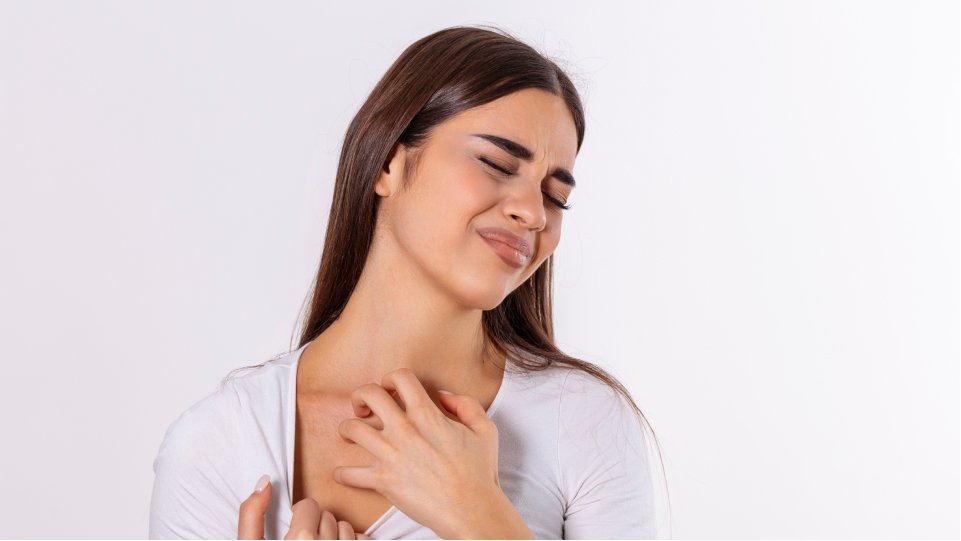Introduction
If you’re experiencing itching, redness and swelling of the skin after sweating — even when your body temperature isn’t high — you may have a sweat allergy. While the condition is rare, it can be uncomfortable and annoying. Fortunately, there are treatments available to help manage the symptoms associated with cholinergic urticaria (CU).
What is a sweat allergy?
A sweat allergy is a type of urticaria or hives. Hives are raised itchy bumps that can be red or pale pink in color and usually appear on your skin as small-to-large blisters.
When you have hives, you’re allergic to something (or multiple things) that touches your skin—like heat or sweating—and triggers an allergic reaction. As with any allergies, the reaction causes certain cells in your body called mast cells to release histamine and other chemicals into nearby blood vessels. These chemicals irritate those blood vessels and cause them to dilate and leak fluid into surrounding tissue, which leads to swelling and inflammation around the area where they leak out.
Symptoms of a sweat allergy
The symptoms of a sweat allergy can be grouped into three different categories:
- Skin symptoms. These include itching, swelling, redness and pain. Other skin conditions such as bumps (papules), hives (urticaria) or swelling of the face, lips, tongue, throat and eyes may occur as well.
- Respiratory symptoms. These are caused by an allergic reaction in the respiratory tract that leads to coughing or wheezing in people with asthma or rhinitis (hay fever). Redness of the lining of your mouth and throat may also be present.
- Digestive system symptoms: Skin reactions in your mouth such as eczema on your lips or inside your cheeks can lead to soreness when eating food; this problem is called dysgeusia which means “difficulty tasting” in Greek-American English slang terms!
When an allergy is present, it may cause swelling of the tongue or throat. Other symptoms include nausea, vomiting, abdominal pain and diarrhea.
Both food and non-food allergies can cause anaphylaxis. This is a life-threatening allergic reaction that occurs within minutes of exposure to the allergen and may lead to shock or respiratory failure if not treated immediately with epinephrine (adrenaline), which must be administered by injection (not an inhaler).
Causes of a sweat allergy
Sweat allergies are caused by either one or a combination of the following:
- Allergies to sweat itself.
- Allergies to chemicals in sweat.
- Allergies to proteins in sweat. This is more likely when left untreated, as allergies can worsen over time and become more severe.
Allergies to sweat itself can be treated with antihistamines, while allergies to chemicals in sweat are treated with topical steroids. Allergies to proteins in sweat can be treated with oral steroids or allergy shots.
Sweating and cholinergic urticaria
Sweating and cholinergic urticaria are two different things. Cholinergic urticaria is a type of sweat allergy, and it’s caused by an allergic reaction to sweat. In response to heat or stress, tiny red bumps appear on your skin—sometimes they’re so small you can’t see them but other times they resemble hives. Acute cholinergic urticaria lasts less than 24 hours; chronic cholinergic urticaria may last for weeks or months at a time.
Sweat allergy diagnosis
The diagnosis of sweat allergy is made by a doctor.
The doctor will ask you about your symptoms and may do a physical exam.
Your doctor may also order tests to help find the cause of your symptoms. Tests may include blood tests and skin or allergy tests. These tests help rule out other conditions that can cause similar symptoms, such as:
- Infections (bacterial or fungal)
- Allergic reactions to something you’re exposed to at work or home, including plants in your garden or on pets
Sweat allergy treatment
It is important to note that the cause of your discomfort may have nothing to do with the sweat itself. If you experience any symptoms related to your sweat, it’s important to see a doctor who can help you understand the nature of your reaction. And determine whether or not it’s due to an allergy or another condition.
If an allergy is determined, anticholinergics—a class of drugs used for conditions like Parkinson’s disease—and antihistamines may be prescribed. These medications work by blocking the chemical acetylcholine which causes some of these reactions. They help by reducing inflammation and itching sensations caused by histamine release during reactions such as exercise or stress (these medications are also taken as cold remedies).
There are also other options available for you if an allergy is the cause of your problem. Some people have found relief by using a cold compress or applying an ice pack to their skin. Which can help reduce inflammation and itching sensations. It may also help to use a moisturizing cream or lotion on affected areas after showering as this can help to reduce dryness.
If you suspect you may have a sweat allergy, talk to your doctor.
If you suspect that you may have a sweat allergy, talk to your doctor. They will need to confirm the diagnosis and provide treatment options. It’s important to treat this condition early, as it can cause lifelong symptoms if left untreated.
Conclusion
Sweat allergy is a rare condition, but it can be extremely debilitating. If you’re suffering from this condition or think you might have it, then make sure to see a doctor for treatment options.
